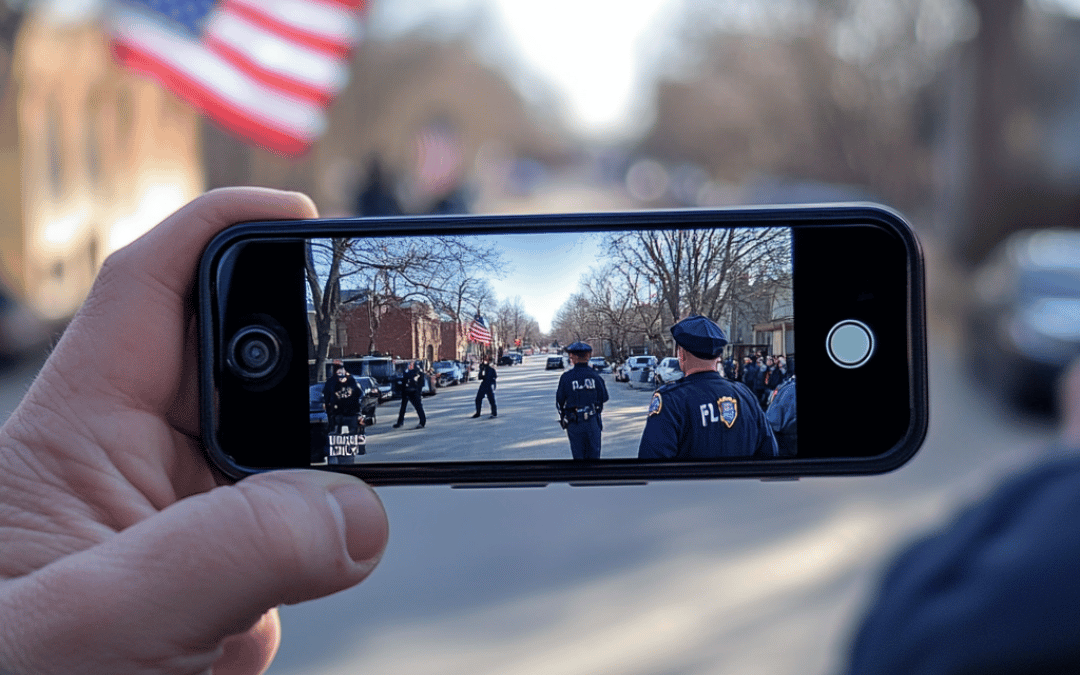In an era of increasing transparency, understanding your rights when recording police encounters in Missouri is crucial. This comprehensive guide will equip you with the knowledge to navigate these situations safely and legally in the Show-Me State.
Missouri’s One-Party Consent Law
Missouri is a one-party consent state, which has significant implications for recording police encounters:
- Only one party to a conversation needs to consent to record it legally
- If you’re participating in the conversation, you can count yourself as the consenting party
- This applies whether you’re in public, at a police station, or in a private home
First Amendment Protection in Public Spaces
The First Amendment protects your right to recording police officers performing their official duties in public spaces in Missouri. This constitutional protection extends to:
- Photographs
- Video recording police
- Audio recording police
Remember, public spaces are key – this includes streets, parks, and other areas where people typically have free access.
What You Can Legally Record in Missouri
When it comes to police encounters and recording police in Missouri, you can generally capture:
- Routine traffic stops
- Interactions during protests
- Public demonstrations
- Law enforcement responses in public areas
Important Limitations to Remember
While your right to recording police is protected in Missouri, it’s not without boundaries:
- Non-interference: You must not obstruct or interfere with an officer’s ability to perform their duties
- Safe distance: Maintain a reasonable distance to avoid safety issues or impeding police activities
- Public spaces only: Your right to record typically applies only in areas where you have a legal right to be present
- Privacy considerations: Be aware of potential privacy issues in non-public spaces
Navigating Confrontations While Recording
If challenged by an officer while recording police in Missouri:
- Stay calm and polite
- Clearly assert your belief in your right to record
- Avoid physical resistance if an officer attempts to confiscate your device
- Remember that police cannot legally delete your recordings or force you to do so
Legal Recourse for Rights Violations
If your rights are violated while lawfully recording police in Missouri, you may have grounds for a civil rights lawsuit. It’s advisable to consult with a Missouri civil rights attorney to understand your options and potential next steps.
Remember, while recording can be a powerful tool for accountability in Missouri, your safety should always be the top priority. Use good judgment and avoid escalating tense situations unnecessarily. By understanding your rights and responsibilities under Missouri law, you can effectively contribute to law enforcement accountability while protecting yourself.
Meet James Law Group Civil Rights Expert John James
Approximately five years ago, John began focusing more on civil cases and ultimately has narrowed his practice down to only civil rights cases. John has helped secure numerous six-figure settlements and judgments, including multiple cases that have garnered significant media attention.
John has spent more than fifteen years holding police accountable for their actions in both criminal and civil settings. His extensive experience in both arenas help give him unique experience and tenacity in pursuing civil rights cases on behalf of citizens that have been taken advantage of by police willing to abuse their power.
This post is meant to be a guide, not legal advice. please contact us if you need legal advice. our team is happy to help.
PROTECTING YOUR RIGHTS
Trust James Law Group to be your advocates in criminal defense cases. We're here to protect your rights and your recovery.

Alarming ‘Reasonable Doubt’ Insights from 4 States
In criminal trials, the prosecutor must prove the defendant’s guilt beyond a reasonable doubt. This is the highest legal standard of proof – meaning that even a belief that the defendant is likely guilty, must result in a not guilty verdict. That high standard is the...

Fighting to Avoid Points: weighing 4 options
Explaining the four most common ways an traffic lawyer can help you avoid points on your license.

SIS probation vs SES Probation in Missouri: What’s essential to Know
Navigating a criminal charge in Missouri can be confusing and understanding "probation" is no different. Here we will address "SIS probation" and how it differs from "SES probation", which is the first thing anyone considering probation should understand. Missouri has...

